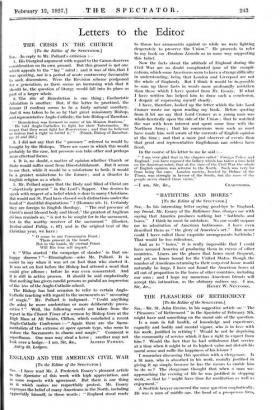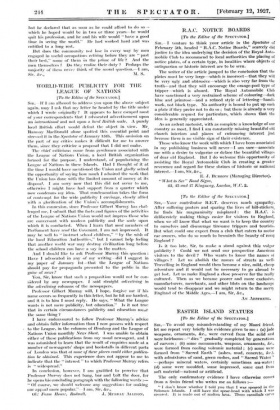THE PLEASURES OF RETIREMENT
• [To the Editor of the SPECTATOR.] SIR,—Mr. St. John Ervine, in his-suggestive article on " The ' Pleasures' of Retirement " in the .S'prelator of February 5th, might have said something on the moral side of the question. Is a man in full health, of knowledge and experience, capacity and bodily and mental vigour, who is in love with his work, justified in retiring ? Would he not be depriving the community of service which it has a right to expect from him ? Would the fact that he had withdrawn that service at a time when it might be at its highest value not disturb his moral sense and ruffle the happiness of his leisure ?
I remember discussing this question with a clergyman. Is a fit man, who is absorbed in his work, morally justified in giving it up simply because he has the means to enable him to do so ? The clergyman thought tlutt when a man was approaching the evening of life he was justified in stopping work, so that he " might have time for meditation us well as enjoyment."
A Scottish lawyer answered-the same question emphatically. He was a man of middle age, the -head of a prosperous firm, but he declared that as soon as he could afford to do so-- which he hoped would be in two or three years—he would quit his profession, and he and his wife would " have a good time in seeing the world." He had worked hard and was entitled to a long rest.
But does the community not lose in every way by men engaged in useful occupations retiring before they are " past their best," some of them in the prime of life ? And the men themselves? Do they realize their duty ? Perhaps the majority of them never think of the moral question.—I am,











































 Previous page
Previous page